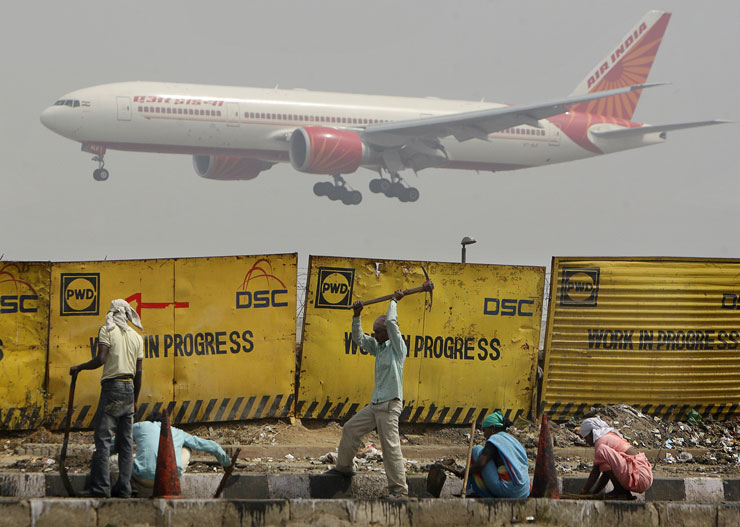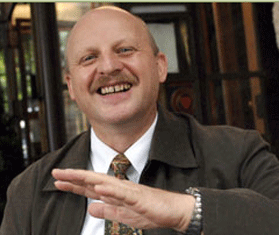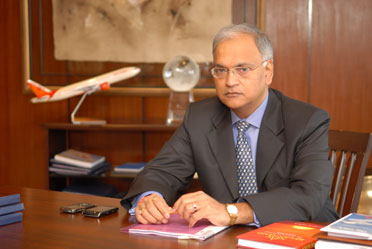Hot Potato Greets Baldauf
At Air India

 After
the severe mauling from the Parliamentary Committee on Public Undertakings
for the merger – termed as an “incompatible marriage”
-- between Air India and Indian (Airlines), Capt. Gustav Baldauf is
winner of its COO Derby. After
the severe mauling from the Parliamentary Committee on Public Undertakings
for the merger – termed as an “incompatible marriage”
-- between Air India and Indian (Airlines), Capt. Gustav Baldauf is
winner of its COO Derby.
Baldauf is the first expatriot chief operating
officer in the flag carrier's history.
His appointment was cleared at Air India's
Tuesday board meeting.
This will not be his first India posting
as he worked at Jet Airways in 2005 as vice-president, flight operations.
Capt. Baldauf, an Austrian national, is
an experienced professional with over 26 years of flying experience
at Austrian Airlines and Air Union and also for airplane manufacturer
Airbus Industrie.
Interviews had been going on for weeks
between five candidates – three of them were short listed last
week from the 140-odd airline executives from around the world who had
sent in their resumes in reply to the advertisement that had appeared
in The Economist and the Financial Times newspaper.
Among those who had applied for the post
were top honchos from American, European and Australian carriers.
 After going through the tough selection
process, a panel comprising Civil Aviation Secretary M. Madhavan Nambiar,
Air India Chairman and Managing Director Arvind Jadhav, (right) industrialist
Anand Mahindra, Vice Chairman and Managing Director of Mahindra and
Mahindra, Uday Kotak, Executive Vice-Chairman and Managing Director
of Kotak Mahindra Bank Ltd, and Sajjan Jindal, Vice-Chairman and Managing
Director of JSW Steel Ltd. chose Capt Baldauf.
After going through the tough selection
process, a panel comprising Civil Aviation Secretary M. Madhavan Nambiar,
Air India Chairman and Managing Director Arvind Jadhav, (right) industrialist
Anand Mahindra, Vice Chairman and Managing Director of Mahindra and
Mahindra, Uday Kotak, Executive Vice-Chairman and Managing Director
of Kotak Mahindra Bank Ltd, and Sajjan Jindal, Vice-Chairman and Managing
Director of JSW Steel Ltd. chose Capt Baldauf.
According to insiders Baldauf has been
handed a hot potato and will have to hit the ground at near full speed
because by any measure he will his hands full.
To begin with, Baldauf will have to attune
himself to his new and hostile surroundings (Air India’s unions
are very powerful and have been opposing the reduction in salaries that
are part of the conditions imposed by the government for awarding a
rescue package to the airline) with the numerous pulls and pressures
prevalent in a government run unit of 30,000-odd employees: walk a tightrope
trying to keep the political pressures down and managing a company with
losses of more than $1 billion.
Added to that is the fact that Gustav
Baldauf will have to work with Booz and Co. and NM Rothschild and Sons
Ltd, the consulting firms that have been asked to chalk out plans for
cost-rationalization and debt-restructuring.
One can only wonder how he will function
since he will have to contend with the bigger power center in the organization,
the Chairman and Managing Director, a government bureaucrat.
Gustav Baldauf has gained a reputation
as some kind of fireman, moving successfully into tough situations with
a hands on, can-do approach such as during his stint at Air Union that
gained the good captain kudos all around.
“Changing an airline culture can
be difficult," Baldauf insists.
“As example decisions and solutions
cannot be put off but must be made quickly and correctly,” he
says.
“Working together and cooperation
is always the best course.
“My philosophy is to engage any
kind of turmoil directly without delay.”
Stay tuned.
TG/Geoffrey
|



